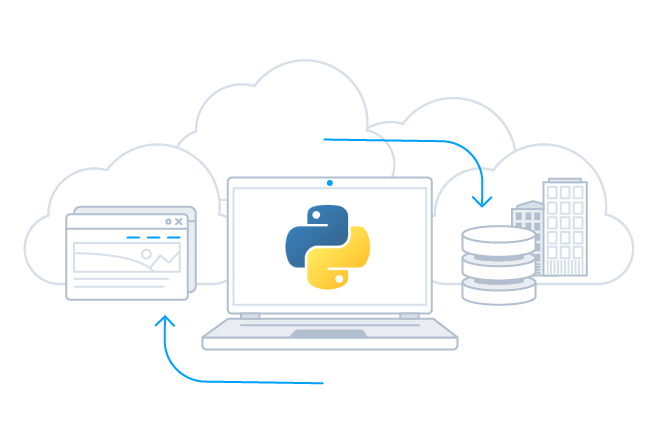Discover how a bimodal integration strategy can address the major data management challenges facing your organization today.
Get the Report →Python Connector Libraries for Microsoft Exchange Data Connectivity. Integrate Microsoft Exchange with popular Python tools like Pandas, SQLAlchemy, Dash & petl. Easy-to-use Python Database API (DB-API) Modules connect Microsoft Exchange data with Python and any Python-based applications.
Features
- Full support for custom and public folders
- Connect to live Microsoft Exchange data, for real-time data access
- Full support for data aggregation and complex JOINs in SQL queries
- Secure connectivity through modern cryptography, including TLS 1.2, SHA-256, ECC, etc.
- Seamless integration with leading BI, reporting, and ETL tools and with custom applications
Specifications
- Python Database API (DB-API) Modules for Microsoft Exchange with bi-directional access.
- Write SQL, get Microsoft Exchange data. Access Microsoft Exchange through standard Python Database Connectivity.
- Integration with popular Python tools like Pandas, SQLAlchemy, Dash & petl.
- Simple command-line based data exploration of Microsoft Exchange Folders, Calendar, Contacts, Tasks, and more!
- Full Unicode support for data, parameter, & metadata.
CData Python Connectors in Action!
Watch the video overview for a first hand-look at the powerful data integration capabilities included in the CData Python Connectors.
WATCH THE PYTHON CONNECTOR VIDEO OVERVIEWPython Connectivity with Microsoft Exchange
Full-featured and consistent SQL access to any supported data source through Python
-
Universal Python Microsoft Exchange Connectivity
Easily connect to Microsoft Exchange data from common Python-based frameworks, including:
- Data Analysis/Visualization: Jupyter Notebook, pandas, Matplotlib
- ORM: SQLAlchemy, SQLObject, Storm
- Web Applications: Dash, Django
- ETL: Apache Airflow, Luigi, Bonobo, Bubbles, petl
-
Popular Tooling Integration
The Microsoft Exchange Connector integrates seamlessly with popular data science and developer tooling like Anaconda, Visual Studio Python IDE, PyCharm, and more. Real Python,
-
Replication and Caching
Our replication and caching commands make it easy to copy data to local and cloud data stores such as Oracle, SQL Server, Google Cloud SQL, etc. The replication commands include many features that allow for intelligent incremental updates to cached data.
-
String, Date, Numeric SQL Functions
The Microsoft Exchange Connector includes a library of 50 plus functions that can manipulate column values into the desired result. Popular examples include Regex, JSON, and XML processing functions.
-
Collaborative Query Processing
Our Python Connector enhances the capabilities of Microsoft Exchange with additional client-side processing, when needed, to enable analytic summaries of data such as SUM, AVG, MAX, MIN, etc.
-
Easily Customizable and Configurable
The data model exposed by our Microsoft Exchange Connector can easily be customized to add or remove tables/columns, change data types, etc. without requiring a new build. These customizations are supported at runtime using human-readable schema files that are easy to edit.
-
Enterprise-class Secure Connectivity
Includes standard Enterprise-class security features such as TLS/ SSL data encryption for all client-server communications.
Connecting to Microsoft Exchange with Python
CData Python Connectors leverage the Database API (DB-API) interface to make it easy to work with Microsoft Exchange from a wide range of standard Python data tools. Connecting to and working with your data in Python follows a basic pattern, regardless of data source:
- Configure the connection properties to Microsoft Exchange
- Query Microsoft Exchange to retrieve or update data
- Connect your Microsoft Exchange data with Python data tools.

Connecting to Microsoft Exchange in Python
To connect to your data from Python, import the extension and create a connection:
import cdata.exchange as mod
conn = mod.connect("User=user@domain.com; Password=password;")
#Create cursor and iterate over results
cur = conn.cursor()
cur.execute("SELECT * FROM Folders")
rs = cur.fetchall()
for row in rs:
print(row)
Once you import the extension, you can work with all of your enterprise data using the python modules and toolkits that you already know and love, quickly building apps that help you drive business.
Visualize Microsoft Exchange Data with pandas
The data-centric interfaces of the Microsoft Exchange Python Connector make it easy to integrate with popular tools like pandas and SQLAlchemy to visualize data in real-time.
engine = create_engine("exchange///Password=password&User=user")
df = pandas.read_sql("SELECT * FROM Folders", engine)
df.plot()
plt.show()
More Than Read-Only: Full Update/CRUD Support
Microsoft Exchange Connector goes beyond read-only functionality to deliver full support for Create, Read Update, and Delete operations (CRUD). Your end-users can interact with the data presented by the Microsoft Exchange Connector as easily as interacting with a database table.
Popular Python Videos:









